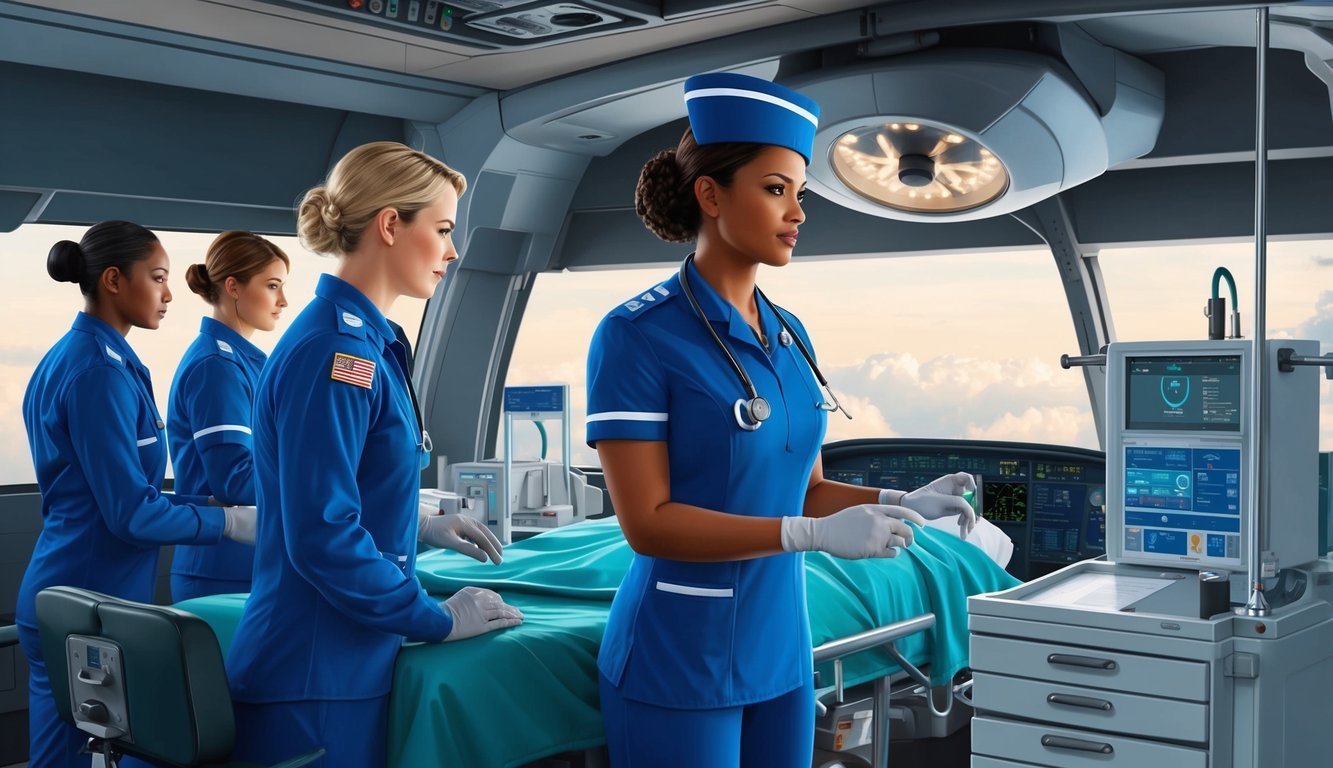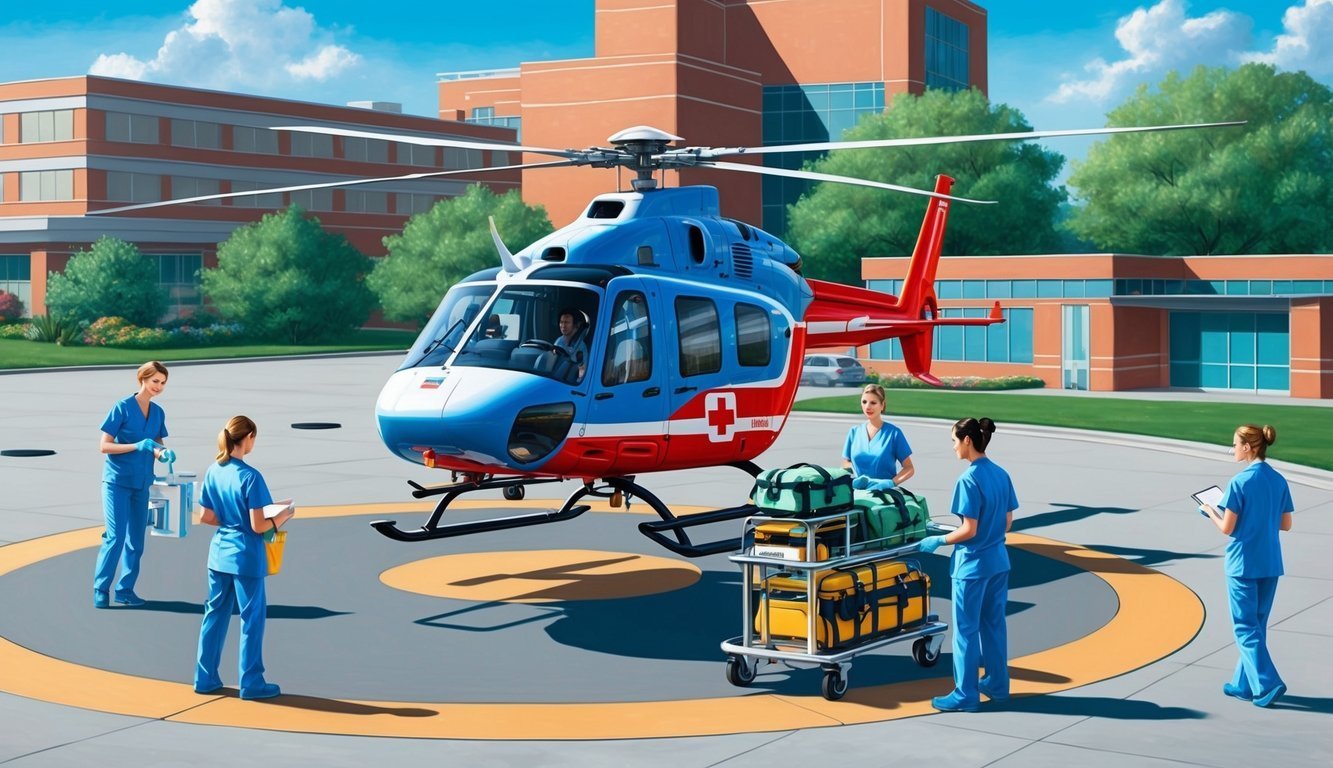Becoming a flight nurse is an exciting opportunity that combines advanced medical skills with the thrill of emergency response.
To embark on this path, you need to start by earning a nursing degree, typically requiring a Bachelor of Science in Nursing (BSN).
After completing your degree, the next crucial step is obtaining your registered nurse (RN) license, which allows you to practice as a professional nurse.
Flight nurses are highly skilled professionals who provide critical care in airborne settings.
It is essential to accumulate substantial clinical experience, particularly in emergency or intensive care environments. This specialized field not only demands clinical expertise but also the ability to make swift decisions in high-pressure situations.
If you are passionate about emergency care and ready to take on the challenges of flight nursing, understanding the necessary steps and preparation will set you on the right course.
You can find more detailed information by exploring resources like BCEN’s CFRN certification or NurseJournal’s guide on how to become a flight nurse.
Educational Pathways

To become a flight nurse, you must pursue specific educational pathways that prepare you for the role.
These pathways typically include earning an Associate’s Degree in Nursing (ADN) or a Bachelor of Science in Nursing (BSN), followed by the option of pursuing advanced degrees to enhance your qualifications.
Associate’s Degree in Nursing
An Associate’s Degree in Nursing provides a foundational education for aspiring nurses.
This program usually takes about two to three years to complete and enables you to become a registered nurse (RN).
Core courses often include subjects such as:
- Anatomy and Physiology
- Nursing Fundamentals
- Pharmacology
After completing your ADN, you must pass the NCLEX-RN exam to obtain licensure.
While an ADN qualifies you to work as an RN, many employers prefer candidates with a BSN for flight nursing positions due to the complexity of critical care situations.
Bachelor of Science in Nursing
A Bachelor of Science in Nursing (BSN) is increasingly favored in the healthcare field.
Most flight nurse employers require a BSN as it emphasizes critical thinking and comprehensive nursing knowledge.
A typical BSN program includes:
- Advanced Health Assessment
- Nursing Research
- Leadership and Management
You will also engage in clinical rotations that prepare you for high-stakes environments.
Graduates with a BSN tend to earn higher salaries and have better job prospects.
Completing a nursing school program leading to a BSN can take four years and often allows for direct entry into specialized nursing roles.
Advanced Nursing Degrees
For those looking to further their careers, pursuing an advanced nursing degree such as a Master’s in Nursing (MSN) may be beneficial.
Advanced degrees can enhance your skills in critical thinking, leadership, and specialized areas of practice.
Programs might offer concentrations in:
- Emergency and Critical Care Nursing
- Nurse Practitioner Roles
Advanced education also allows you to take on supervisory or administrative roles.
While not always required for flight nursing, an advanced degree can increase your competitiveness in the field, particularly in high-demand situations.
Professional Licensure and Certification
To pursue a career as a flight nurse, you must navigate the requirements of professional licensure and relevant certifications.
Understanding these key components is essential for establishing your qualifications in the field.
NCLEX-RN and RN Licensure
Before becoming a flight nurse, you must obtain your Registered Nurse (RN) license.
This involves passing the National Council Licensure Examination for Registered Nurses (NCLEX-RN), a standardized test that assesses your knowledge and competency in nursing care.
To take the NCLEX-RN, you’ll need to have completed an accredited nursing program, typically a Bachelor of Science in Nursing (BSN) or an Associate Degree in Nursing (ADN).
Following your graduation, you will submit an application to your state’s nursing board and pay the associated fees.
Once approved, you can schedule your examination.
Upon passing the NCLEX-RN, you’ll be granted your Registered Nurse license.
This license is crucial, as it allows you to practice as a nurse and is a prerequisite for pursuing specialized certifications relevant to flight nursing.
Specialty Certifications
In addition to obtaining your RN license, earning specialty certifications can enhance your qualifications and career prospects.
As a flight nurse, you may consider pursuing the Certified Flight Registered Nurse (CFRN) credential, which demonstrates your expertise in providing care in aeromedical situations.
Another valuable certification is the Certified Emergency Nurse (CEN), focusing on emergency nursing skills, or the Critical Care Nurse (CCRN), which emphasizes critical care knowledge.
Each of these certifications requires specific clinical experience and successful completion of an examination.
These certifications not only bolster your resume but also ensure you possess the specialized skills necessary for the dynamic environment of flight nursing.
For more details, visit the BCEN for CFRN certification information and test preparation resources.
Critical Care and Emergency Experience
Gaining experience in critical care and emergency settings is essential for aspiring flight nurses.
This experience equips you with the necessary skills to handle high-stress situations and provides foundational knowledge for advanced medical care in flight.
Intensive Care Unit (ICU)
Working in an Intensive Care Unit (ICU) is one of the most valuable experiences you can have as you prepare for a flight nursing career.
In the ICU, you will care for patients with life-threatening conditions who require close monitoring and advanced medical care.
Duties include administering medications, managing ventilators, and monitoring vital signs.
An ICU setting exposes you to various critical scenarios that require quick decision-making and advanced clinical skills.
Your familiarity with complex medical equipment and the ability to collaborate with an interdisciplinary team will directly translate to the challenges faced in flight nursing.
This experience can significantly enhance your qualifications.
Emergency Room (ER)
Experience in an Emergency Room (ER) is another critical component of your preparation.
In this fast-paced environment, you will encounter patients with a wide range of medical emergencies, from trauma to respiratory distress.
Developing your ability to prioritize care and perform rapid assessments is vital.
You will work alongside physicians and other healthcare professionals to stabilize patients before they are admitted for further treatment or transferred to other facilities.
The experience gained in the ER will sharpen your skills in emergency medical care, making you a strong candidate for flight nursing roles that often require quick thinking and adaptability.
Critical Care Nursing
Critical care nursing encompasses both ICU and ER experiences, focusing on the care of severely ill patients.
This nursing specialty demands a deep understanding of pathophysiology, advanced pharmacology, and intensive monitoring techniques.
Training in critical care will build competencies in managing life-threatening conditions and utilizing advanced medical technologies.
Specialized certifications in critical care nursing can enhance your qualifications and prepare you for the unique challenges of flight nursing.
By immersing yourself in critical care settings, you will develop the skills and confidence necessary for success as a flight nurse, where critical thinking and quick action are paramount.
Additional Training and Skills

To excel as a flight nurse, you need to pursue specialized training and develop critical skills.
This not only enhances your competency but also ensures effective patient care in high-pressure situations.
Here are key areas of focus.
Life Support and Resuscitation Courses
A solid foundation in life support is essential.
You should obtain certifications in Basic Life Support (BLS), Advanced Cardiac Life Support (ACLS), and Pediatric Advanced Life Support (PALS).
| Course | Description |
|---|---|
| BLS | Covers basic emergency procedures, including CPR and the use of an AED. |
| ACLS | Provides advanced knowledge for managing cardiac emergencies, including medications and interventions. |
| PALS | Focuses on pediatric emergencies, emphasizing the unique needs of children. |
These courses refine your skills in critical situations, making you an invaluable asset during patient transport.
Trauma and Transport Courses
Specialized trauma training is crucial due to the nature of flight nursing.
Enroll in the Transport Professional Advanced Trauma Course (TPATC), which prepares you to manage trauma patients effectively during transport.
Key topics in TPATC include:
- Rapid assessment of injury severity.
- Principles of trauma care in transit.
- Tactical evacuation procedures.
This training equips you to make quick, informed decisions to stabilize patients during transport, ultimately improving patient outcomes.
Development of Critical Thinking and Communication Skills
Strong critical thinking and communication skills are vital for flight nurses.
You must quickly assess patient conditions and communicate effectively with your team and other healthcare professionals.
To enhance these skills:
- Engage in simulation training exercises that mimic real-life scenarios.
- Participate in workshops focusing on effective communication in critical situations.
Improving these areas ensures that you can provide high-quality care and collaborate seamlessly with your team.
Career Progression and Specialization
As a flight nurse, your career trajectory can lead to various opportunities for advancement and specialization.
Understanding the paths available can help you enhance your skills and meet the demands of this dynamic profession.
Gaining Experience in Flight Nursing
To succeed in flight nursing, accumulating relevant clinical experience is crucial.
Typically, you should start with a solid foundation in emergency situations and patient care.
Many flight nurse positions require at least two years of experience in critical care or emergency nursing before transitioning to the role of a flight nurse.
Once in the field, you will manage patient care during medical transport, gaining firsthand experience in high-pressure environments.
Maintaining certifications in Advanced Cardiac Life Support (ACLS) and Pediatric Advanced Life Support (PALS) can boost your employability.
You may also consider seeking positions as a transport nurse for added experience in transferring patients between facilities.
Exploring Nursing Specialties
Flight nursing offers a range of specialties that further enhance your expertise.
You can pursue areas such as trauma nursing, critical care, or pediatrics.
Specialized training in these fields can improve your skills in handling complex medical scenarios.
Consider obtaining certifications related to your chosen specialty.
For example, the Board Certification in Emergency Nursing (BCEN) can be beneficial.
Specialized roles often lead to higher salaries and greater job security.
Engaging in professional organizations or attending workshops can also help you stay updated with best practices in flight nursing.
Military Vs. Civilian Flight Nursing
Understanding the differences between military and civilian flight nursing can influence your career path.
Military flight nurses often work with branches like the Air Force or Air Force Reserve.
They engage primarily in medical evacuations and work under rigorous conditions in combat zones.
In contrast, civilian flight nurses typically operate in a more controlled environment.
They focus on critical care during medical transport.
Both roles demand extensive nursing experience.
However, military flight nursing offers unique training and leadership opportunities.
Pursuing either option can result in a fulfilling career in flight nursing, but the choice will shape your experiences and the skills you develop along the way.

